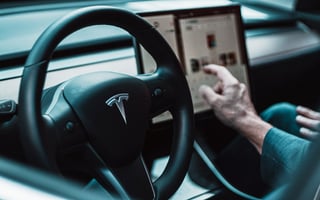How about this for an approach to dealing with journalists – don’t deal with them at all?
How many crisis communication challenges can one organisation face at the same time?
For Tesla, it seems, there is no upper limit.
The electric car firm’s fortunes seem stuck firmly in reverse as it accelerates from one PR disaster to another.
A plummeting share price, sliding sales, ‘Tesla Takedown’ protests, and customers distancing themselves from its products are just some of the issues it faces.
Can it get back on track? And what does the road ahead look like for the brand?
Let’s begin by taking a closer look at some of the company’s problems.
Share price
Tesla’s share price has slumped.
At the end of 2024, its stock price was $403.84.
By the end of Monday (31/3), the electric vehicle company's stock price was $259.16
That’s a 35.82 per cent decline during the first quarter of 2025.
Ouch.
Car sales
Tesla sales are also plummeting.
Figures released yesterday (2/4) show the electric car maker delivered almost 337,000 electric vehicles in the first three months of 2025.
That is a 13 per cent drop from a year ago and considerably fewer cars than analysts had predicted.
Protests
Part of the reason for the sharp share slump and falling sales is that Tesla is at the centre of public anger over the political activity of Elon Musk, its CEO.
The man once viewed as a genius disrupter has become a regular presence at the White House since Donald Trump moved back in.
He leads the Department of Government Efficiency (Doge), which has been tasked with cutting US government jobs and finding other efficiencies.
And he finds the time to regularly share his political views on his social media platform X.
It has led to protests called the Tesla Takedown. And there were reportedly more than 200 last weekend across the US, Canada and Europe as part of a Global Day of Action.
Other forms of protest have seen people post on social media about getting rid of their Teslas. Singer Sheryl Crow and actor Jason Bateman are among the well-known names who have dumped the vehicles.
Some Tesla owners have been using stickers of other manufacturers to ‘rebrand’ their EVs. Or buying bumper stickers that say, “I bought this before Elon went crazy”, which has become an Amazon bestseller.
Additionally, Tesla cars, showrooms and charging stations have been vandalised and destroyed.
Earlier in March, the company was booted out of the International Auto Show, in Canada, over safety concerns about potential protests.
Other risks
Amid the slumping share price, the company faces other risk factors.
Question marks around quality have been highlighted by an influential report. It found that the quality of Tesla’s battery-electric vehicles and those of traditional carmakers were the same - 266 problems reported per 100 newly sold or leased.
Tesla had previously outperformed the electric vehicles of legacy automakers in the JD Power survey.
To add to the quality headache, US safety regulators recently recalled Tesla-made Cybertrucks over concerns about a panel falling off and causing a hazard.
And while Tesla is floundering, Chinese manufacturer BYD – viewed as one of its main rivals - is soaring, eclipsing it in annual sales.
So, it seems Tesla faces a reputation headache everywhere it turns.
And Musk is at the centre of these crisis comms challenges.
It is something he appears to admit. Speaking at the weekend after its latest share slump, he said: “What they’re trying to do is put massive pressure on me, and Tesla I guess, to ... stop doing this.
“My Tesla stock and the stock of everyone who holds Tesla has gone, went roughly in half. I mean it’s a big deal.”
The Tesla brand is intrinsically linked to its CEO.
That may have once been viewed as a strength when he was perceived as trying to change the world for the better. But it now seems increasingly like a vulnerability.
It means there is no safe distance between his political views and a brand that had been a symbol of progressive values.
Tesla had been popular with environmentally aware motorists.
But it increasingly seems that customer and brand values are out of step.
This is not just my view.
Matthias Schmidt, a Berlin-based electric car analyst, said: “He (Musk) has become the core toxic issue behind the disintegration of the brand and should step aside before it explodes like one of his rockets.”
Ross Gerber, chief executive of the US investment management firm Gerber Kawasaki, which holds shares in Tesla, said: “He (Musk) left himself open to a direct way for people to attack him if they don’t like his politics.
“It’s ironic because the vehicles were made for liberals who care about the environment, and it has become a symbol of the conservative movement.”
The situation reminds me of the Warren Buffett quote we sometimes use during our crisis communication training - “It takes 20 years to build a reputation and five minutes to ruin it.
So, what happens next?
It seems unlikely Musk will leave the driver’s seat anytime soon.
And there is a school of thought that the protests will run out of momentum. That could happen. But there is a counter argument it is increasingly tricky to predict what Musk will do next, and anything particularly controversial or polarising could quickly escalate them again.
Of course, the Trump/Musk bromance could also quickly crumble, leaving the CEO to focus more on his day job.
But if things stay the same, Tesla is on the risky road of appealing to an increasingly shrinking audience.
So, the brand may need to find a way to create distance between itself and its CEO.
Are there other leaders who can become a more prominent voice for the brand and rebuild connections with environmentally conscientious consumers? And who can show that what Musk says – and posts on X – is not what the brand thinks?
That distance could also move the company away from the image of having a CEO who is asleep at the wheel as problems mount. How focused can he be on Tesla’s woes with his other commitments? It’s a legitimate question.
One of the crucial obstacles to making this happen – egos aside – is that Tesla formally dissolved its PR team in 2020, with Musk saying that he doesn’t believe in “manipulating public opinion”.
At the time, Tesla was receiving seemingly endless positive coverage, and Musk was viewed as a one-man PR machine with a dedicated following that bridged divides.
But times have changed, and it needs PR and comms professionals more than ever to navigate a route to a reputation rebuild.
Media First are media and communications training specialists with nearly 40 years of experience.
We have a team of trainers, each with decades of experience working as journalists, presenters, communications coaches and media trainers.
Click here to find out more about our crisis communication training courses and crisis management testing.




